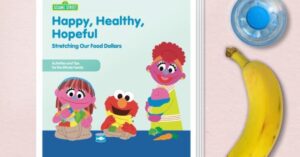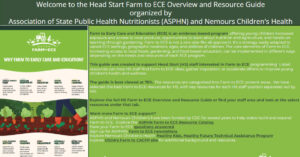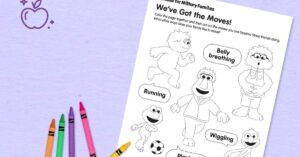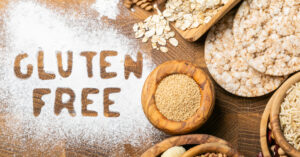Preventing Lead Poisoning
This Mealtime Memo from our partners at ICN defines lead, identifies lead sources, describes the health effects of lead exposure, explains why children are at risk, and shares important information on how to prevent lead poisoning.
Healthy Cooking
A nutritious meal starts with healthy ingredients, and how those ingredients are prepared or cooked is important. This Mealtime Memo from our partners at the Institute of Child Nutrition explores ways to prepare nutritious meals in the Child and Adult Care Food Program (CACFP) using healthy ingredients and cooking methods.
Eat Well and Stay Healthy
We know this might be a challenging time for families that might be experiencing food insecurity. Our partners at Sesame Street in Communities wanted to share a few resources that may support the children and families you serve.
Healthy Families
Our partners at Sesame Street in Communities work to support families in raising healthy, happy children. They have developed new resources designed to help parents and caregivers foster strong connections and promote emotional and physical well-being in little ones.
Digital Well-being
Our partners at Sesame Street in Communities are helping families build healthy digital habits and make informed tech choices within their unique circumstances. New resources equip parents and providers with practical tools to support children’s development, enhance family well-being, and prepare children to grow up smarter, stronger, and kinder in a digital world.
Introducing Solid Foods to Infants
Infants’ nutritional needs evolve during their first year, and introducing solid foods is crucial in their development. Our partners at ICN provide information to help introduce solid foods smoothly. They cover recommendations for when and how to start, suggest suitable foods, highlight foods to avoid, and provide tips to reduce the risk of choking.
Head Start Farm to ECE Overview and Resource Guide
Our partners at the Association of State Public Health Nutritionists (ASPHN) and Nemours Children’s Health are pleased to share the Head Start Farm to ECE Overview and Resource Guide.
Happy, Healthy, Ready
Sesame Street for Military Families has launched new resources to encourage healthy habits through engaging and enjoyable activities.
Follow and Stretch Brain Builders
There’s one word that likely comes to mind when you think of toddlers: WHY? Why is the sky blue? Why do we brush our teeth? Why do I have to go to sleep? Constantly asking “why?” is a sign your child’s brain is growing! They are curious and want to learn all about the world around them. Vroom can help you make the most of the whys through the Brain Building Basics of Follow and Stretch.
Gluten-Free Diets
The gluten-free diet has generated a lot of attention in recent years, with some praising its benefits. However, for people who cannot eat gluten due to medical reasons, such as celiac disease or gluten sensitivity, this diet is not a choice but a necessity. Our Partners at the Institute of Child Nutrition defines gluten and how it affects certain individuals, lists foods containing gluten, identifies gluten-free foods, and reviews how to accommodate children who require a gluten-free diet.










